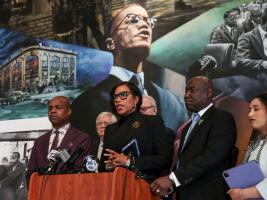The standard version of rock and roll history does not allot much space at all to the discussion of African American women.
“Popular music is political: it’s a site where relations of power play out.”
In this series, we ask acclaimed authors to answer five questions about their book. This week’s featured author is Maureen Mahon. Mahon is Associate Professor of Music at New York University Her book is Black Diamond Queens: African American Women and Rock and Roll.
Roberto Sirvent: How can your book help BAR readers understand the current political and social climate?
Maureen Mahon: In our current moment, we’re witnessing a reckoning around issues of diversity, equity, and inclusion as institutions begin to acknowledge the ways race, racism, and white supremacy have shaped their structures and practices. The recording industry is certainly subject to this reckoning. Alongside the assertion that Black Lives Matter we can also claim that The Creative Work of Black People Matters. Put simply, the American recording industry is built on the creativity of African Americans. Black Diamond Queens focuses on developments in popular music between the mid-1950s and the mid-1980s and spotlights African American women, showing how they participated in the creation and perpetuation of rock and roll. In my book, I emphasize the musical labor of African American women who in many cases did not receive full financial compensation or cultural recognition for their contributions. These contributions generated economic benefits for the record labels they recorded for and created fresh sounds that invigorated the industry. Yet most narratives of rock and roll history spend little time on artists such as Ruth Brown, Etta James, and LaVern Baker who were among the first wave of rock and rollers in the 1950s. Discussions of girl group music of the early 1960s tend to highlight the producers and songwriters instead of the girl group artists themselves, most of whom were African American women—groups such as the Shirelles, the Crystals, the Chiffons, and the Ronettes. By the 1970s, when African American women such as Betty Davis, Claudia Lennear, and the trio Labelle were producing music that had rock elements, they struggled to access audiences because of stereotypes of what kind of musical sound was appropriate for black women. Understanding this history and context, particularly the way race and gender shape artists’ experiences in the industry, helps us make sense of what we see in the contemporary recording industry.
What do you hope activists and community organizers will take away from reading your book?
I hope that all readers will come away from the book with an appreciation of the importance of being skeptical of the official narrative and the value of listening for the voices of people who have been pushed to side in those narratives. They have important stories to tell us. Listen, especially, to women. The standard version of rock and roll history does not allot much space at all to the discussion of African American women; instead, it presents a male-centered story and a story that becomes whiter and whiter as the years move from the fifties to the sixties to the seventies. Yet as I went through the archives and listened to the music, I could see and hear that African American women were part of the story, but their presence wasn’t highlighted. As I conceptualized, researched, and wrote Black Diamond Queens, I drew on black feminist scholarship and thought about the impact of the intersection of race, gender, sexuality, and musical genre on the careers of African American women vocalists to help understand the simultaneous presence and erasure of African American women. I suspect that in many cases it would be productive for activists and organizers to build an intersectional approach into their work. Another concept I hope readers will take with them is an understanding that popular music is political: it’s a site where relations of power play out. The experiences of African Americans in the recording industry illustrate this: from the creation of segregated music markets, to the exploitative contracts that many artists sign, to the borrowing of African American musical sound and style by non-African Americans who achieve greater financial success than the artists they borrow from. These are issues of access and equity that are well worth the attention of activists.
We know readers will learn a lot from your book, but what do you hope readers will un-learn? In other words, is there a particular ideology you’re hoping to dismantle?
One thing I hope Black Diamond Queens will help readers unlearn is the idea that there is no connection between African American women and rock music. Through my discussion of the careers of a cross-section of vocalists, I hope to show the pivotal but under-acknowledged role that African American women have played in the development of rock and roll since its inception in the mid-1950s. Women like Big Mama Thornton, LaVern Baker, and Tina Turner provided models for how to sing rock and roll. During the late 1960s and 1970s, African American background singers such as Merry Clayton, Venetta Fields, Clydie King, and Gloria Jones brought their gospel-inspired vocals to what we now call “classic rock” on songs by the Rolling Stones, Lynryd Skynyrd, Pink Floyd, David Bowie, Joe Cocker, and Bob Dylan, significantly shaping the sound of rock. The idea that “rock music is for white people” that solidified in the 1970s and 1980s made it very difficult for African American artists to establish themselves as rock acts, but there were artists such as the group Labelle—Patti LaBelle, Nona Hendryx, and Sarah Dash—who, in the 1970s, produced innovative work that pushed musical and lyrical boundaries. Tina Turner managed to break through as a mainstream rock star in the mid-1980s, but that was a hard-won effort. In the book, I trace the strategies she used over the course of her career that enabled her to achieve the title “Queen of Rock and Roll.” Through these and other examples, I want to show that there has been a black presence in rock, but that too often that presence, especially the presence of black women, has been erased or downplayed.
Who are the intellectual heroes that inspire your work?
I’ve been inspired by the intellectual work of Nina Simone’s words and music since I was a little kid. I found Chimamanda Ngozi Adichie’s admonition about the dangers of a single story very motivating as I worked on a book devoted to uncovering stories about African American women that had been obscured or ignored. I was also inspired by the large canvases of visual artists Mickalene Thomas and Wangechi Mutu and the ways their imaginative representations of women take up space in galleries and museums where black women are often not visible. I want African American women to take up space in the rock and roll history narrative. I deeply appreciate the writings of Ida B. Wells, W.E.B. DuBois, Zora Neale Hurston, Audre Lorde, Paule Marshall, Kamau Brathwaite, and Margo Jefferson. Ethnomusicologist Portia Maultsby is another intellectual inspiration; her extensive archiving of materials related to African American popular music at Indiana University’s Archives of African American Music and Culture, a research center that she founded, is phenomenal. I am also inspired by the work of colleagues who have researched the contributions of African American women musicians. I’m thinking of Sherrie Tucker’s Swing Shift: “All-Girl” Bands of the 1940s, Gayle Wald’s Shout, Sister, Shout! The Untold Story of Rock-and-Roll Trailblazer Sister Rosetta Tharpe, and the work of Daphne Brooks whose forthcoming book Liner Notes for the Revolution: The Intellectual Life of Black Feminist Sound I am eagerly awaiting. Finally, I would be remiss if I didn’t mention my brother-in-law Greg Tate. He writes about music and culture with wisdom, insight, wit, and flair. His book Flyboy 2: The Greg Tate Reader is a great way to get acquainted with his writing.
In what way does your book help us imagine new worlds?
My hope is that Black Diamond Queens will help readers recognize that there are many possibilities for African American musical expression, so much more than what the mainstream recording industry routinely allows us to access and more than what we might expect based on what we have listened to up to this point. By reading about African American women who followed unconventional pathways as they developed their musical careers and who broke out of the creative boxes African Americans were expected to work within, I hope readers will begin to see and hear some of these different possibilities. I hope they will be inspired to check out the music of the important forerunners of black rock and Afropunk highlighted in my book and mentioned in this interview. I also hope they will support contemporary African American women musicians who are doing innovative work, women like Tamar-kali, Martha Redbone, Toshi Reagon, Alicia Hall Moran, Brittany Howard, and Kelsey Lu. One of the ways we can imagine new worlds is by imagining a different set of sonic possibilities for African Americans. By extension, we can begin to imagine a broader range of social possibilities for African Americans and the kinds of institutions and communities that would nurture this diversity.
Roberto Sirvent is Professor of Political and Social Ethics at Hope International University in Fullerton, CA, and an Affiliate Scholar at Yale University’s Interdisciplinary Center for Bioethics, where he directs the Race, Bioethics, and Public Health Project. He is co-author, with fellow BAR contributor Danny Haiphong, of the book, American Exceptionalism and American Innocence: A People’s History of Fake News—From the Revolutionary War to the War on Terror.
COMMENTS?
Please join the conversation on Black Agenda Report's Facebook page at http://facebook.com/blackagendareport
Or, you can comment by emailing us at comments@blackagendareport.com



















